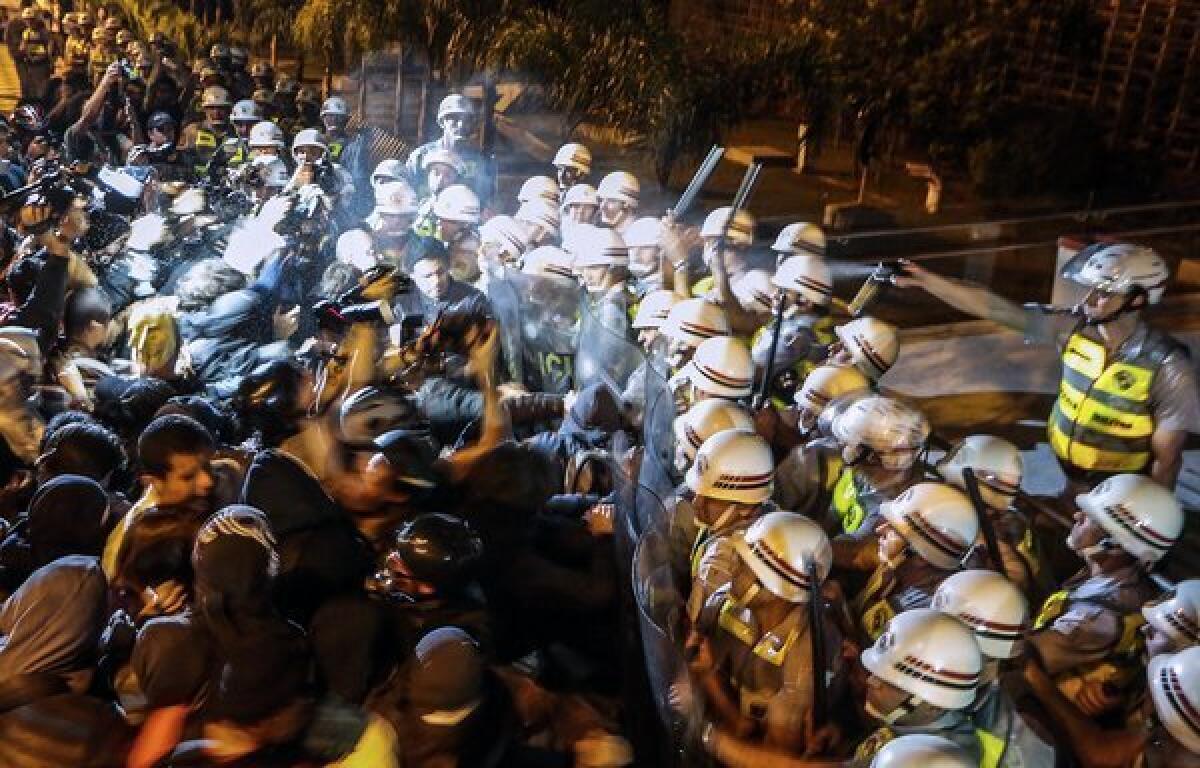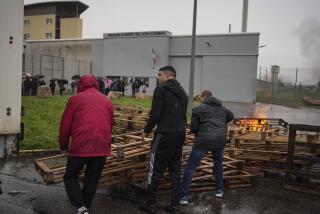Brazil court sentences 25 police officers in 1992 prison massacre

- Share via
SAO PAULO, Brazil -- A Brazilian court on Saturday sentenced 25 police officers to serve 624 years each for their roles in a prison massacre more than two decades ago.
The 1992 incident left 111 prisoners dead after police entered Sao Paulo’s Carandiru Penitentiary to put down a revolt. It became an iconic example of how Brazil’s military police can sometimes kill with impunity, an issue which has recently moved to the center of ongoing street protests.
The court on Saturday convicted the officers of murder in the killings of 52 inmates. Other officers were convicted in April, and more trials are expected this year. As is common in the Brazilian legal system, the 25 officers will be allowed to remain free until the appeals process has been exhausted.
Local press reported the elite police troops showed little reaction while being condemned by the jurors, and their lawyer, Ieda Ribeiro de Souza, said the fault lies with then-Gov. Luiz Antonio Fleury Filho, who oversaw security forces in the state.
“Who should be here is Dr. Fleury. He didn’t go [to Carandiru] himself” because he had political protection, said Ribeiro de Souza.
Human rights groups have long decried conditions in Brazil’s prisons and the behavior of the military police – which many call a relic of Brazil’s dictatorship – but the Carandiru massacre gained special attention in Brazil because of its size and a popular 2003 movie.
Some survivors of the violence said police made little attempt to negotiate with the revolting prisoners, entered firing, and continued to fire on prisoners who had surrendered or were hiding. Others said they hid among the scores of bodies, pretending to be dead, to avoid the gunfire. No police were killed.
A police crackdown on protests in June resulted in more than a million people taking to the streets across Brazil last month. Demonstrations continued in Rio and Sao Paulo this week under the slogan, “Where is Amarildo,” referring to Amarildo de Souza, a resident of a Rio de Janeiro slum who disappeared after police took him from his home July 14.
Protesters this week said they want to know what has become of him, and for Rio Gov. Sergio Cabral and Sao Paulo Gov. Geraldo Alckmin to answer for abuses committed by police.
De Souza had no criminal record and the construction worker and father of six was reportedly well-liked for helping out around the neighborhood. Relatives fear he may be dead.
The military police were on an operation to apprehend drug traffickers, but De Souza was not involved with the narcotics trade, relatives said, and police say he was taken in to verify his identity and quickly released. But human rights activists and relatives say he would not have needed to be brought in to have his identity verified.
Police say that of the 84 cameras installed in the Rocinha slum, two cameras were out of order the day Amarildo disappeared.
“Of all the cameras [in Rocinha] only two weren’t working that day. Exactly the two cameras that would have filmed Amarildo leaving the [police] station, as the police say he did,” said Marcelo Freixo, a member of Rio’s state assembly known for human rights campaigns. “And those two cameras stopped working on exactly that day.”
ALSO:
Egypt military says protesters use children as human shields
Iran’s new leader causes furor with remarks about Israeli occupation
Can Brazil fix mistakes from Pope Francis visit in time for World Cup?
Bevins is a special correspondent.
More to Read
Sign up for Essential California
The most important California stories and recommendations in your inbox every morning.
You may occasionally receive promotional content from the Los Angeles Times.












